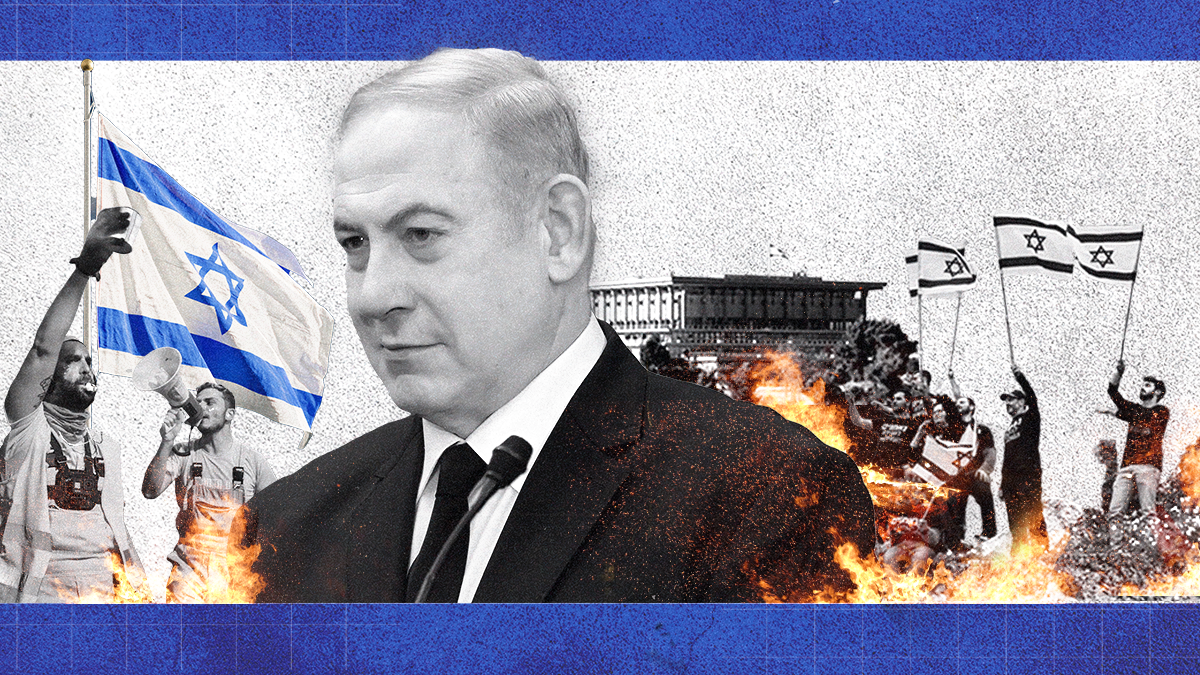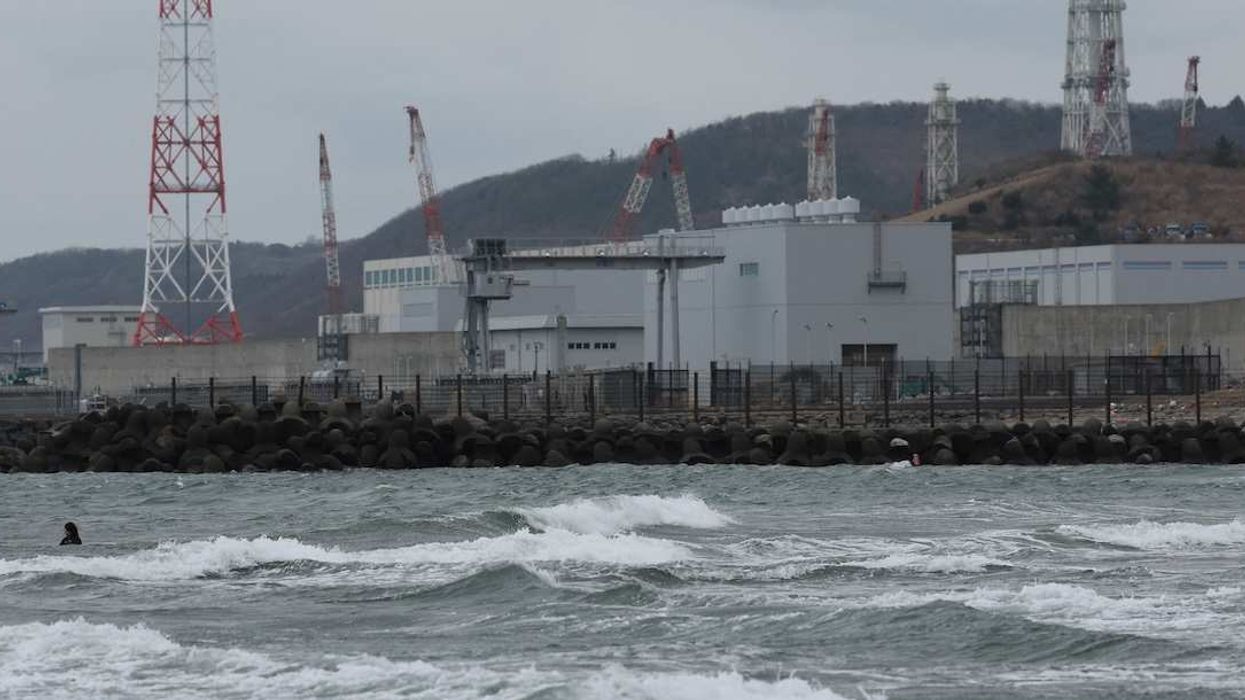What happened, exactly?
Since taking office last December, the far-right coalition led by Israel's Prime Minister Benjamin “Bibi” Netanyahu had been trying to get legislation passed that would give the executive full control of the supreme court’s composition and allow the Knesset (Israel’s parliament) to overturn supreme court rulings with a simple majority.
While many of the reform’s proponents are motivated by a desire to check what they’ve long viewed as an overly activist, liberal, and anti-democratic judiciary, Bibi himself primarily saw it as a means to stay out of prison and in power.
The judicial overhaul was met with unprecedented opposition, with hundreds of thousands of Israelis across the political and social spectrum taking to the streets nationwide for 12 consecutive weeks. Thousands of mission-critical soldiers and reserve forces said they wouldn’t report for duty if the legislation passed, and several diplomats resigned from their posts in protest. The country’s business community and tech sector threatened to paralyze the nation’s economy if the government didn’t recalibrate, with hundreds of international economists, leading banks, credit rating agencies, and even Israel’s central bank chief warning the overhaul would seriously harm the nation’s business and investment climate.
Still, Bibi refused to back down.
The showdown came to a head over the weekend when Bibi summarily fired Yoav Gallant, Israel’s defense minister and a member of his own Likud Party, for publicly warning that the legislation would be detrimental to national security.
Mass spontaneous demonstrations erupted almost immediately across the country. Critically, Israel’s largest labor union, representing nearly a quarter (!) of the total workforce, announced a general strike for the first time in its history, shutting down everything from Ben Gurion Airport to shopping centers, hospitals, universities, local governments, and every McDonald’s in the country (they were … not lovin’ it). This prompted more Likud members to speak out against the bills, raising concerns that they would not get enough votes to pass.
Bibi finally blinked on Monday night, delaying a vote on the legislation until the Knesset’s summer session (which starts after Passover and goes until July) in what he called “a timeout for dialogue.” By Tuesday morning, the trade unions had called off the strike.
And so, the crisis was defused — for now.
Who wins and loses from the suspension?
After three months of ceding no ground despite the damage done to Israel’s social, economic, and military fabric, one could be tempted to see Bibi’s announcement as a climbdown or a concession. It’s not. The pause is a pit stop, a tactical breather to lower tensions and deprive the opposition of momentum that doesn’t commit the government to any genuine concessions in return.
Bibi hasn’t canceled the legislation. On the contrary, he has promised his far-right coalition partners that he will still ram it through, and with his own physical freedom on the line, there’s every reason to believe it’s only a matter of time until he tries again.
His pledge to hold good-faith negotiations with the opposition is made more challenging by his using the same speech to blame the pro-democracy “extremists” for inciting civil strife. There’s nothing to prevent the prime minister from announcing a breakdown in talks at a time of his choosing, leaving the government days away from being able to pass the legislation.
In fact, Bibi’s only material concession was not to the bill’s critics but to the hard right, which got promised a brand-new national guard under the direct command of Israel’s extremist national security minister, Itamar Ben-Gvir, to help tackle rising crime in mixed Jewish-Arab cities. Given the police force’s reluctance to repress pro-democracy protests in recent weeks, a private militia may even prove an asset to Netanyahu when the time comes to push the reform through once and for all.
Would the judicial reforms spell the end of democracy?
A political system as fragmented as Israel’s, where no one party can ever control the government and where coalitions are incredibly hard to put together and even harder to maintain, has an inbuilt structural check on all power: division.
This informal but deeply entrenched check is more binding than the formal check that is separation of powers, and it makes Israel’s democracy more resilient than Hungary’s or Turkey’s. There’s nothing Bibi or anyone can do to change that.
Yes, the proposed overhaul would in theory empower the executive and parliament to constrain the judiciary, but political division would limit how strongly any governing coalition could constrain judiciary independence in practice. In fact, the very reason why the judiciary is so strong in Israel is precisely because of how structurally weak Israeli governments are.
The idea that any one side or leader could suddenly and irreversibly take control of the supreme court, when you have 15 political parties and it’s almost impossible to get a majority to agree on anything and any government can fall apart overnight, begs credulity.
That doesn’t mean the judicial reform is a good idea — it isn’t. Israel’s democracy would take a hit, as would its economy. But it wouldn’t be the catastrophe or “attempted coup” its opponents claim.
What does this all mean for Bibi?
Like Donald Trump, Bibi is a political animal. Unlike Trump, he is an incredibly skilled tactician. These two features have allowed him to hold Israel’s highest office for 15 years despite countless scandals and challenges to his rule, defying all predictions. But he’s neither infallible nor invincible.
Dismissing his defense minister for warning about a potential national security threat — literally in his job description — was a lapse in judgment, prompting trade unions, the entire security apparatus, and some senior members of his party to lose confidence in him. So was attacking patriotic reservists as refuseniks and saboteurs in a country where virtually every citizen serves in the military. He definitely underestimated the degree of popular backlash the judicial overhaul would face.
Are these missteps enough to end his political career?
Perhaps. The Gallant episode has forced some of the more establishment-minded Likud members to see Bibi for who he has become: a man desperate to avoid jail no matter the cost to the nation. More damningly, his Monday “capitulation” is leading the hardliners to start questioning his worth as a partner. For a leader like Bibi, the only thing worse than looking incompetent is looking weak.
True, the government still commands a slim majority in the Knesset, and Bibi will probably manage to keep his fragile coalition together for at least a few more months. But he could easily lose the support of several Likud MPs if the legislation proceeds in the summer as he’s promised the far right, and he could easily lose the far right if he reneges on his promise — or if he can't muster the votes from his own party to get it passed.
To be clear, it’s entirely possible this isn’t the issue that ends the Netanyahu government. But sooner or later, something will break the coalition. And when voters head to the polls next, they will remember that it was Bibi who pushed the country to the brink for personal gain.
___________________
🔔 Be sure to subscribe to GZERO Daily to get the world's best global politics newsletter every day on top of my weekly email. Did I mention it's free?



















